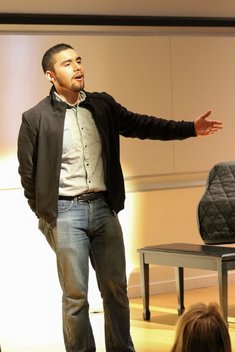THE LAST DAY MY FATHER SPENT IN MEXICO
ANTONIO LOPEZ
Antonio day-dreams under el guamúchil, its thorny pods shield him from the deformed bricks his parents hurl from home. The thud against the wall, that separated the backyard y los labores, echoes inside this adobe-cotta soldier. The shrapnel of their words, “Lárgate ya,” cut at his heart. In his mouth lies the taste of the night before, of the flakes of a brown concha that still paste his chin. The latest spoil of the ongoing civil wars of pan dulce, among ten hermanos that ended in truce because he negotiated with Nita the last of the Azucaradas for it. He sighs the last exhaust from hitching a 6 am camión whose tail pipes iban hacía Pajacuarán to la secundaria; from siphoning the sun for diez pesos under Doña Olga’s fresa fields. He sighs to remember the taste of meat. El campo después de la cosecha is barren; only shriveled cornstalks litter its piso. They suckle his tears, so that by the end of the week-long border crossing, they are drowned out by the sounds of el norte’s July 4th cuetes. At eighteen years old, he’ll clean tables at Hyatt restaurants with imported sweat. He’ll bite his tongue under every “pick it up,” and “excuse me,” and “Hey, you,” grunted amidst clanking silverware. He’ll see the chalk of clients’ white fingers snapping the outline of crime scenes, on streets still spelled in Spanish but with different shades of the burnt tortilla. He’ll smuggle his wife and two children into Sunday brunch, so that as a black-vest waiter pours orange juice over a wine glass, I’ve learned, with a nun’s piety, to stop calling him papá in public. He’ll learn the underside of an aguacate bears the same texture as un cuerno de chivo, of auto-defensas and warring carteles patrolling the plazas of El Paracho, where he’d awkwardly dance with novias. Meanwhile, on this side of North America, he sees the avocado is trending, hollowed out so white people can mine its green gold to make caramel lattes. He does all this, so that thirty four years after leaving, every morning, a Chevy suburban stacked with papeles in inglés is vehicle-marshalled by his father, who now spends his mornings walking down Haley St., who naps while we huddle over the bonfires of an almuerzo in a small apartment with three plastic chairs but six different pictures of the Virgin Mary. He knocks on his parents’ apartment door with a sack of masa, laughing how otherwise, your abuelita will say she can’t tortillar. This morning, apá pours greasy caldo over a casuela of chiles rellenos, while his mom tugs at a lid of gelatina. Its tricolor custard slows her nervios over the upcoming visita to el USCIS oficina, pa’ arreglar su residencia, lest her frail body keep swaying to the harsh seasons de la visa. As she struggles to peel away the Jello’s pegamento, she sighs how he’s “El único hijo que manda dinero,” how the older women are tired of praying for the México they once knew, how curfew is now when an AK-47 dips from behind the cerros, and stands over the town square’s pink gazebo. As we leave, he takes that same hunchbacked brick, and lowers it as a doorstop. So his parents can shuffle their feet across the carpet to open the door. So they can cross the threshold, and properly despirse de él.
Raised in the San Francisco Bay Area, ANTONIO LOPEZ received a double B.A. in Global Cultural Studies (Literature) and African-American studies from Duke University (Class of 2016). He’s an inaugural John Lewis Fellow, a recipient of Rudolph William Rosati Creative Writing Award, and a finalist for the 2017 Nazim Hikmet Poetry Prize. His nonfiction has been featured in TeenInk, The Chronicle, PEN/America and his poetry in Gramma Press, Eclectica, Hispanecdotes, La Bloga,Acentos Review, Sinking City, What Rough Beast, By&By, and Permafrost. He is currently pursuing a Master in Fine Arts (poetry) at Rutgers University-Newark.


